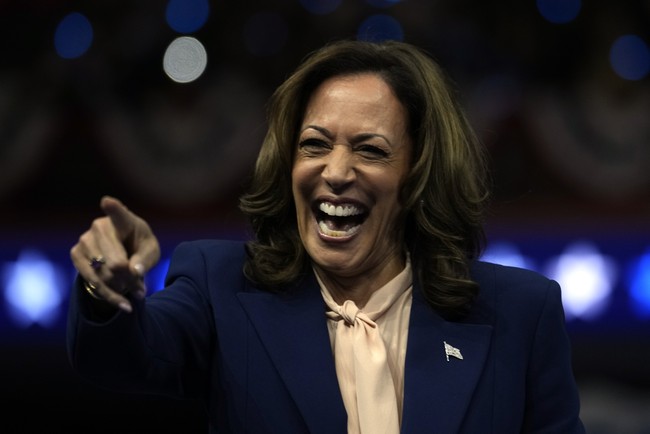
There are likely many who have stories about how Vice President Kamala Harris’ approach to criminal justice has caused great harm. The story of actor Jamal Trulove, however, presents a particularly glaring example that Democrats would rather remain hidden.
Trulove’s story presents a striking example of a wrongful conviction brought about by police misconduct and a flawed prosecution. The actor was convicted of the 2007 murder of his friend Seu Kuka in San Francisco. The case against him relied heavily on the testimony of a single eyewitness who later admitted to being coerced by law enforcement.
During his trial, then-San Francisco District Attorney Kamala Harris’ office handled the prosecution, which resulted in Trulove being sentenced to 50 years in prison. His conviction was overturned after he was incarcerated for six years. He later won a $13.1 million settlement in a lawsuit against the city.
In a recent video interview on the “Art of Dialogue” YouTube channel, Trulove discusses the moment when he was convicted and describes Harris’ disturbing reaction.
Yeah, we ended up losing and after I lost, got convicted, the sentence came in. Obviously, the courtroom is full. I know who this lady Kamala Harris is. People in the projects knew who she was because she was a Black district attorney. And we thought that we had a Black district attorney in office … who we perceived to be black … and that’s all we knew. We would think that she would be a little bit more favorable to us.
Trulove recounts that nobody from Harris’ office “tried to talk to me or anything of the sort” and that “It was strictly ‘You did this. We’re charging you. You’re going down.’”
The actor discussed seeing Harris’ reaction when the guilty verdict was announced.
And you see Kamala Harris is literally like front row, opposite side on the defensive side. And when they came with the verdict, guilty me, I wanted to make sure I seen everything that was in that month on that side, not supporting me and everybody else that was on that side. Because I knew, for one, I didn’t do it. I stood on principle, and I was going to fight to ultimately get back. And I’ll never forget when I turned around and I looked and I seen Kamala Harris. We locked the eyes this one time, and she laughed. She literally just busted out laughing, almost as in she was pointing at her neck like, Ha, ha, ha, ha. That’s how I felt. She didn’t point, but that’s how I felt when she was laughing at the verdict coming down.
“I’ll never forget when I turned around and I looked and I seen Kamala Harris. We locked eyes this one time, and she laughed.”
– Actor Jamal Trulove describing the moment he was convicted by Kamala Harris’ office for a crime he did not commit.#KamalaHarrisSucks pic.twitter.com/rdp9yiQ5BO
— Jeff Charles, Doni’s St. Bernard🏴 (@jeffcharlesjr) August 18, 2024
Harris did not personally prosecute Trulove’s case. However, her office’s aggressive tactics and the subsequent success she enjoyed in her political career as a tough-on-crime prosecutor have become a point of contention when folks like Trulove share their stories, as RedState’s Jennifer O’Connell reported:
One local writer who examined her years as San Franciso District Attorney said of Harris: “In the decade since Harris had first been elected DA, she had built a reputation as a careful politician with an eye on the next office.” It was when Harris had her eye on being attorney general that the 2007 murder of Seu Kuka by Jamal Truelove came into the SF DA’s office. [Editor’s note: Several sources give the name’s spelling as “Truelove,” while others use “Trulove.” We have preserved the spellings as-is.]
After a jury convicted Jamal Trulove, then 25, of first degree murder in February 2010, then-San Francisco District Attorney Kamala Harris praised the “brave witness who stepped forward from the crowd.” Harris was then running for attorney general of California and in her campaign bragged about her high conviction rates as the San Francisco DA. Harris echoed what her deputy prosecutor Linda Allen said repeatedly to the jury: Priscilla Lualemaga, the only eyewitness to testify at trial about the July 2007 homicide of Seu Kuka, did so at great risk of retaliation. “She’ll never get her life back,” Allen said, adding that Lualemaga testified knowing that “maybe [she’ll] get killed over being a witness because she saw someone else kill someone.”
What is truly disturbing about Trulove’s case is that there was no physical or forensic evidence linking him to the murder. There were no other witnesses that identified him. Unfortunately, this did not matter to Harris’ office.
Stories like Trulove’s exemplify why many black Americans are not supporting the vice president – especially black men. The Harris campaign has been trying to win back at least some of these voters. But as more stories like this emerge, it will become even harder for the vice president to convince black voters to vote for her.

